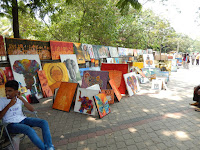I want to cross-post this from Campaign Chronicle, the Prajnya 16 Days Campaign against Gender Violence blog.
True confession: Through the first three decades of my life, I was what one might call an inveterate, unstoppable letter-writer, where letter was a composition written by hand on paper. You might say, therefore, that the Letterbox Resistance activity was bound to be something I enjoyed.First, the preparations! The design of the little cards with the campaign logo. The campaign logo stamp. The colour paper and envelopes. The bonafide 50 paise postcards. This may count as the most fun campaign prep ever!
This was the first activity of the 2016 Campaign. Ragamalika and I were the core group of letter-writers that went through all three sessions on the 25th.
We met the first group at Chamiers Cafe, where we ended up occupying two long tables. Enthusiastic and full of ideas, we churned out a variety of letters here--postcards addressed to specific offices, letters addressed very generally to categories of people, posters and flyers. Some of these needed to be sent to the addressee, but a few were tucked away here and there, to be found by other diners. One participant handed over a letter to another group explaining what we were doing. And we also shared cards and stamps with some of the staff. We hope everyone wrote the letters they were planning to write! Most of the group then disbanded.
Our second stop was Coffee Central, a cosy cafe in T.Nagar. A much smaller group met here, but the words continued to flow... mostly! We wrote reflective notes, we wrote apologies and we wrote to our kids. We also got others in the cafe to write a note, addressed to parents around the world!
The third stop was at the Food Court in Phoenix Mal and by now, there was just the core left. We were joined by Prajnya's Administrator, Santha. As we settled down with our papers spread out, a security attendant very politely requested us to please leave. People were not allowed linger in the Food Court doing anything other than eating and taking selfies. Out of consideration for her, we packed up sooner than scheduled, quietly placing some of our letters around the mall.
I cannot tell you how much I enjoyed this activity and on how many levels. First of all, picking out stationery is always delightful. Then, the physical pleasure of writing deliberately on a sheet of paper--taking trouble over both the words and their transcription-constitutes an almost-meditative experience. Third, the process of identifying what you want to say, who you need to say it to, how you want to phrase it and the tone you want to adopt, and finally putting it down on paper is an empowering one. It cuts to the heart of the helplessness we feel faced with something as huge as 'one in three women face abuse in their lifetime.' It gives each of us a sense of agency. Finally, it reminds us of the geneology of online petitions. They began with letters that were copied by hand laboriously and mailed to decision-makers and editors around the world. This power remains with us. We should exercise it more often!
To read all the letters we wrote, see our Facebook album.What did I write? You should join us too!






























